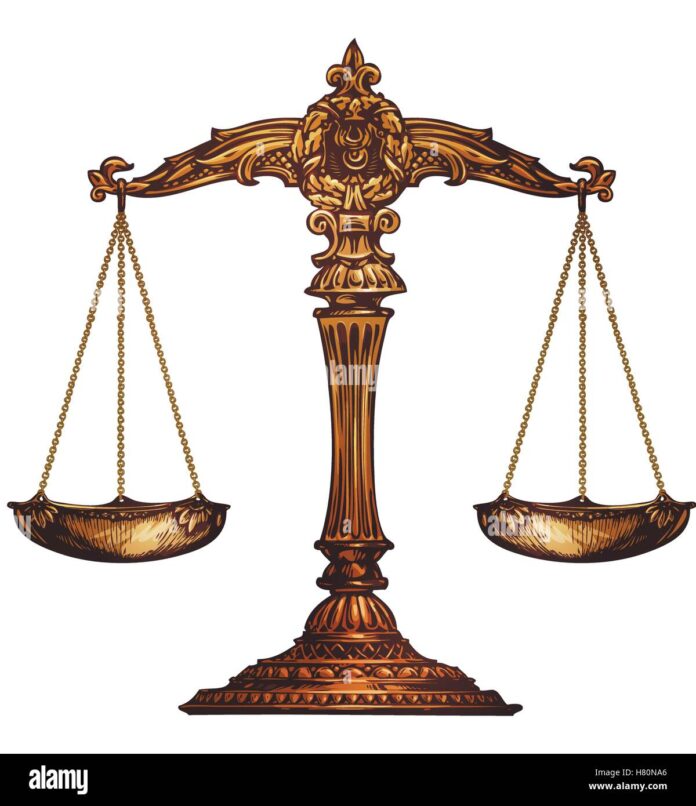In 2008, the Revenue Mobilisation Allocation and Fiscal Commission (RMFAC) reviewed upward the salaries and allowances of Nigerian judges. The pay raise took effect from February 1, 2007. Unlike their counterparts in other parts of the world who enjoy periodic pay raise, the salaries and allowances of Nigerian judges have remained stagnant for 15 years. Worse still, judges who retired from the state high court bench are presently being owed gratuities and pension with some of them filing writs in court to compel payment of their entitlements. In this report, Ise-Oluwa Ige examines the plight of the poorly paid Nigerian judges and the on-going fight by the bar to remedy the situation.
Background
On May 23, 2022, a retiring Justice of the Supreme Court of Nigeria (SCN), Justice Ejembi Eko lamented that no Nigerian judge enjoyed a pay raise in the last 14 years.
Justice Eko said nothing has been done to remedy the situation notwithstanding that the issue kept appearing in the resolutions of the annual conferences of All Nigerian judges.
He said it is more disturbing that no one has a clear idea of who is in dereliction of the constitutional duty to review the remuneration, and salaries and allowances of judicial officers since 2007 after the last pay raise was done.
Justice Eko who illuminated other issues affecting the judiciary was particularly close to tears on the plight of retired judges of state high courts, sharia courts and customary courts whose employers have refused to pay their pension and gratuities.
The occasion where he poured his mind was the valedictory court session organised in his honour by the Supreme Court of Nigeria to celebrate his contributions to the development of law in the country in the last 33 years he spent on the bench.
He had the courage to speak on the issue on the day he was exiting the bench unlike the incumbent President of the Court of Appeal, Justice Dongban-Mensem who, notwithstanding the conservative nature of the judiciary, called the attention of the world to the issue at a public forum on September 13, 2021.
The bar was also indeed worried by the attitude of relevant authorities to review upward the salary and allowances of judges in the country and had used every available opportunity to call attention to the issue.
For instance, a prominent member of the inner bar, life bencher, and pioneer Attorney-General and Commissioner for Justice of Osun State, Chief Adegboyega Awomolo (SAN) had on July 12, 2020, also lamented what he called the shameful official salary approved by the Federal Government for judges in the country.
He said whereas the government cannot run or stabilize without the judiciary yet, as important as the third arm of government is, it has always been at a disadvantage.
“Under the Constitution of the Federal Republic of Nigeria (1999 as amended), there are three arms of government—The executive, the legislature, and the judiciary. They are what constitute the Government of the Federal Republic of Nigeria. Each of them is allocated its portfolio to manage the Federal Republic of Nigeria. The legislature makes the law; the executive carries out the law, and the judiciary carries out judicial functions to resolve disputes between individuals, persons and governments, individual persons and individual persons, and between government and government. It can also determine if there are disputes between the three tiers of government.
“Unfortunately, the judges who constitute the judiciary are paid less than what senators earn in Nigeria. They are paid less than what House of Representatives members earn in Nigeria. And in the state, it is not better. What has happened is that nobody has spoken for them. They cannot speak for themselves. They cannot down the tools. They cannot go to the public to canvass for increase in salary. They cannot, on their own, initiate a case and say come and determine whether our salaries and conditions of service and remunerations are adequate. So, because of that lacuna, the executive and the legislature have been taking advantage of them.
“Worse still, since 1999, the executive and the legislature have been conniving to increase the burden, the work of the judiciary. They timed them by the Constitution: all electoral matters must be determined between so, so time and so, so time. They have been increasing their burden, they have been creating hardship, inconveniences and great burden on the judiciary. But they are not paid well. Yet, these judicial officers have been carrying on with the hope that someday, they will be adequately remunerated.
“The point is that without the judiciary, our democracy would have collapsed. Without judiciary, our democracy would have gone and the military would have taken over several times. You know, at various points, we reach a breaking point that we think, oh, the end has come but the judiciary has always come to rescue our democracy. Yet, they are least recognised. They are dying in hundreds and nobody is knowing, nobody is taking note. And this is because of the onerous job they do and the effect on their health. They are poorly paid. Their condition of service is not improved and they suffer in silence.
“For me, it is time for Nigerians to say, oh, it is time to say let us try and help these helpless group of people because without judiciary, there will be no democracy. Then, we will have autocracy, we will have anarchy or military dictatorship. None of these is favourable to the common man in the street. For me, it is unkind and unfair to treat our judicial officers the way we are treating them.
“I remember when I was invited to join the bench, they were earning just N4,000 per month then. I said no. it is not a place for me where I will be suffering in silence and I would die in silence. It is not for me,” Awomolo (SAN) said.
The irrepressible social critic, human and civil rights lawyer, Chief Abdul-Ganiyu Oyesola Fawehinmi, GCON, SAN, (now late) had also lamented severally the plight of the Nigerian judges during his days.
According to him, “the hardship that are continuously encountered by judges of all categories are all clear for everybody to see. Trial judges take evidence in long hand, conduct researches and write judgments, most times without the aid of well-equipped libraries. In the end, some of them die as quickly as they retire.
“No wonder, Hon Justice Olusola Olatunde Thomas who retired as Chief Judge of Lagos State on November 27, 1996 at 65 died on June 6, 1999 less than 3 years after he retired. Hon Justice Roseline Ajoke Omotosho who retired as the Chief Judge of Lagos State also died less than three years after she retired. The same unfortunate death befell Hon Justice Fernandez who retired at the age 65 years and died shortly after.
“Some of our judges die in office under circumstances that are related to the barbaric conditions in which they work. Hon Justice C, Idigbe of the Supreme Court –one of our best justices died in office at the age of 59 years. Hon Justice Augustine Nnamani—the erudite intellectual of the Supreme Court died on September 22, 1990 at the age of 56 years. Hon Justice Ligali Ayorinde, Chief Judge of Lagos State died at the age of 64 years. Hon Justice John Idowu Conrad Taylor, one of the most courageous judges died at the age of 56 years. Hon Justice Adeniyi Adefila (JP) of Borno State High Court, died on July 7, 1998 at the age of 60 years and Hon Justice Yekinni Olayiwola Adio of the Supreme Court died in office on Tuesday, July 8, 1997 after a brief illness. They all died in office!
“Sadly today, some judges have strokes while in service. Judges are confronted with avoidable trauma, stress and strain while trying to dispense justice unlike their colleagues in some other countries where conditions for dispensation of justice are just simply good, very comfortable and progressive,” he said.
Gani said the situation is not the same in other countries of the world where judges are appreciated and well taken care off.
“In England, Lord Goddard retired at the age of 89 years, 4 months and 29 days whilst Lord Denning retired at the age of 83 years, 7 months and 29 days and he died at the age of over 100 years. Hugo Black retired at the age of 85 from the United States of America Supreme Court whilst Thurgood Marshal and Harry A. Blackman both of the United States of America Supreme Court retired at the ages of 82 and 85 respectively.
“It is ironic that despite the fact that our judges work under serious and excruciating conditions, they deliver more judgments than most of their counterparts in the established democracies,” he said.
The situation has not really changed even in 2022 as so many other judges had at one time or the other become incapacitated while still in office while many others retired into serious health crisis and died shortly after bowing out of the bench.
It is an open secret that the last time the judges’ salaries and allowances were increased was in 2007 following the enactment of the “Certain Political, Public and Judicial Office Holders (Salaries and Allowances, etc) (Amendment) Act of 2008” which came into force on February 1, 2007.
The law had repealed a similar Act of 2002 to create room for the increase of judges’ basic salaries, allowances and fringe benefits in 2007.
Under the “Certain Political, Public and Judicial Office Holders (Salaries and Allowances, etc) (Amendment) Act, 2008”, the CJN’s annual basic salary is N3,353,972.50 (or N279,497.71 monthly), while other Justices of the Supreme Court and the President of the Court of Appeal receive N2,477,110 as basic annual salary or N206,425.83 monthly each.
Table 2: 2007-2020 Annual Basic Salary of the Chief Justice of Nigeria, Justices of the Supreme Court & President of the Court of Appeal
| Emoluments | Chief Justice of Nigeria | Associate Justices | Appeal Court President |
| Annual Basic | N3,363,972.50 | N2,477,110.00 | N2,477,110.00 |
Source: Economic Confidential
The Justices of the Court of Appeal, Chief Judge of the Federal High Court, Chief Judge of the Federal Capital Territory (FCT) High Court and President of the Industrial Court, Grand Khadi of State and FCT Sharia Court of Appeal, President FCT and State Customary Court of Appeal earn annual basic salary of N1, 995,430.18 each.
Table 3: Basic annual salaries of justices of the Court of Appeal Heads of Federal and State High Court, Sharia & Customary Court of Appeal
| S/N | Salary | Justice of the Court of Appeal | Chief Judge of Federal High Court | Chief Judge of FCT High Court | Judge of the Federal High Court | President National Industrial Court | Grand Khadi, FCT Sharia Court of Appeal | President, FCT Customary Court of Appeal | President of State Customary Court of Appeal | Chief Judge of a State | Grand Khadi of State Sharia Court |
| 1 | Annual Basic | N1,995,430.18 | N1,995,430.18 | N1,995,430.18 | N1,995,430.00 N1,995,430.18 | N1,995,430.18 | N1,995,430.18 | N1,995,430.18 | N1,995,430.18 | N1,995,430.18 | N1,995,430.18 |
Source: Economic Confidential
Also, judges of the Federal, State and FCT High Courts, National Industrial Court, Khadi Sharia Court of Appeal in the FCT and State; and FCT and State Customary Courts also earn an annual basic salary of N1,804,740.00 each.
Table 4: Basic annual salaries of judges of the Federal and State high Courts, Customary and Sharia Court of Appeal
| S/N | Salary | Judge Federal High Court | Judge of National Industrial Court | Judge of FCT High Court | Judge State High Court | Khadi, FCT Sharia Court of Appeal | Judge FCT Customary Court of Appeal | Khadi of State Sharia Court of Appeal | Judge, State Customary Court of Appeal |
| 1 | Annual Basic | N1,804,740.00 | N1,804,740.00 | N1,804,740.00 | N1,804,740.00 | N1,804,740.00 | N1,804,740.00 | N1,804,740.00 | N1,804,740.00 |
Source: The Economic Confidential
The salaries of all categories of Nigerian judges have since remained static since February 2007.
Conversely, a survey of judges’ salaries in other countries of the world showed that they not only enjoyed periodic review of their salaries but that the salaries of Nigerian judges are also mere fractions of what their counterparts earn.
For instance, a District Court judge in the US which is an equivalent of a Federal or a state high court judge in Nigeria presently earnes $216,400.00 basic salary per annum which if converted to Nigerian Naira at the 2022 average exchange rate of N415: 1$ translates to N89,806,000.00 (N89.8) while a Nigerian Federal or state high court judge goes home with N1,804,740 (N1.8m) annual basic salary. By implication, a high court judge in Nigeria in 2022 with his N1,804,740 .00 (N1.8m) annual basic salary earns 2.0% of the annual basic salary of a district court judge in the United States.
Similarly, a Circuit court judge in the US which is an equivalent of Court of Appeal judge in Nigeria presently (2022) earns $229,500.00 as basic salary per annum which if converted to Nigerian Naira at the average exchange rate of N415: 1$ in 2022 translates to N95,242,500 (N95.2m) while a Nigerian Justice of the Court of Appeal goes home with N1, 995,430.18 (N1.99) annual basic salary. By implication, a Justice of the Court of Appeal in Nigeria in 2020 with his N1,995,430.18 (N1.9m) annual basic salary earns 2.0% of the annual basic salary of a Circuit court judge in the United States.
Also, an Associate Justice of the Federal Supreme Court in the United States which is an equivalent of the Justice of Supreme Court of Nigeria presently earns $265,600.00 as basic salary per annum which if converted to Nigerian Naira at the average exchange rate of N415: 1$ in 2022 translates to N110, 224,000.00 (N110.2m) while a Nigerian Justice of the Supreme Court goes home with N2,477,110.00 (N2.47m) annual basic salary.
By implication, a Justice of the Supreme Court in Nigeria in 2022 with his N2,477,110 (N2.47m) annual basic salary earns 2.24% of the annual basic salary of his counterpart (Associate Justice) in the United States.
In the same vein, the Chief Justice of the Federal Supreme Court of the United States which is an equivalent of the Chief Justice of Supreme Court of Nigeria presently earns $277,700.00 as basic salary per annum which if converted to Nigerian Naira at the average exchange rate of N415: 1$ in 2022 translates to N115,245,500.00 (N115.2m) while the Chief Justice of the Supreme Court of Nigeria goes home with N3,353,972.50 (N3.35m) annual basic salary. By implication, the Chief Justice of the Supreme Court of Nigeria in 2022 with his N3,353,972.50 (N3.35m) annual basic salary earns 2.9% of the annual basic salary of his counterpart (Chief Justice) in the United States.
The table below captures the salary of judges in the United States of America between year 2016 when the average exchange rate of one US Dollar (USD) to Nigerian Naira (NGN) was 1$: N253 till the year 2020 when the average exchange rate of one US Dollar to Nigerian Naira has significantly jumped to 1$: N380.
Table 5: Federal Judges’ Salaries in US between 2016 and 2020
| Year | District Judge Salary in USD | District Judge Salary in NGN | Circuit Judge Salary in USD | Circuit Judge Salary in NGN | Associate Justice Salary in USD | Associate Justice Salary in NGN | Chief Justice of US salary in USD | Chief Justice of US salary in NGN |
| 2020 | $216,400 | N82,134,620.00 | $229,500 | N87,210,000.00 | $265,600 | N100,928,000.00 | $277,700 | N105,526,000.00 |
| 2019 | $210,900 | N75,924,000.00 | $223,700 | N80,532,000.00 | $258,900 | N93,204,000.00 | $270,700 | N97,452,000.00 |
| 2018 | $208,000 | N75,088,000.00 | $220,600 | N79,636,600.00 | $255,300 | N92,163,300.00 | $267,000 | N96,387,000.00 |
| 2017 | $205,100 | N62,555,500.00 | $217,600 | N66,368,000.00 | $251,800 | N76,7999,000.00 | $263,300 | N80,306,500.00 |
| 2016 | $203,100 | N51,384,300.00 | $215,400 | N54,496,200.00 | $249,300 | N63,072,900.00 | $260,700 | N65,957,100.00 |
Source: United States Courts: Judicial Compensation (www.uscourts.gov)
Key:
- District Court is where a federal case begins. Cases heard consist of statutory cases that violate the constitution, its treaties or cases affecting citizens like felonies, divorce cases etc
- Circuit court holds both trials and appeals decided by district courts.
- Supreme Court is the highest court in the US. It accepts 1% of all cases it receives. By virtue of this, circuit courts can be very influential as they are able to set legal precedents when deciding appeals
- Associate Justice in America is any member of the Supreme Court of the United States
- Chief Justice of US presides over the Supreme Court
As it can be seen from the table above, the annual basic salary of the judges of all categories in the United States increased every year (2016 to 2020) but the same cannot be said of the salaries of Nigerian judges which have remained static since 2007!
Worse still, the average exchange rate of one USD to Nigerian Naira (NGN) in 2007 when Nigerian judges received a pay rise was $1: N117.88. It jumped insignificantly to 1$: N117.98 in 2008; 1$: N158.6 in 2014; 1$: N253.5 in 2016; 1$: N305.8 in 2017; 1$: N361 in 2018; 1$: N360 in 2019; 1$: N380 in 2020 and 1$:N415 in 2022.
The implication is that the salaries of judges in Nigeria have not kept pace with inflation and when adjusted for inflation, the Chief Justice of Nigeria (CJN) and all categories of judicial officers in the country actually make less now in 2022 than what they did between 2007 and 2019 when Naira was indeed stronger than what it is today.
A further backward glance of the salaries of United States federal judges and all categories of the Nigerian judges in 2001, for instance showed that while the Chief Justice of Nigeria earned N1,938,000.00 (N1.9m) basic salary per annum which was the equivalent of $14,355.55 with the 2001 exchange rate of N135: $1, the Chief Justice of the United States of America earned $186,300.00 basic salary per annum which at the 2001 exchange rate amounted to N25,150,500.00 (N25m).
The statistics showed that the Chief Justice of Nigeria earned less than 8% (precisely 7.71%) of the salary of the Chief Justice of the United States of America.
By implication, the Chief Justice of Nigeria earned a relatively high (though shamefully) 7.71% of the salary of the Chief Justice of the United States of America in 2001 but it dropped to 3.17% in 2020 notwithstanding that he received a pay raise from N1.9m which he earned in 2001 to N3.35m which he earns in 2020.
Table 6: Salaries of Heads of Judiciary in Nigeria, US and UK in 2001
| S/N | Country Head of Judiciary | Country Currency | Salary of Chief Justice in Country Currency | Salary of Chief Justice in NGN |
| 1 | Chief Justice of Nigeria | Nigeria (NGN) | N1,938,000.00 | N1,938,000.00 |
| 2 | Chief Justice of the United States | USA (USD) | $186,300.00 | N25,150,500.00 |
| 3 | Lord Chancellor of England | United Kingdom (GBP) | £173,875.00.00 | N33,036,250.00 |
| 4 | The Lord Chief Justice of England | United Kingdom (GBP) | £171,375.00 | N32,561,250.00 |
Source: Source: The Way The Law Should Go by Chief Gani Fawehinmi (SAN)
As it can be seen in Table 6 above, the Lord Chancellor of England in 2001 similarly earned £173,875.00 basic salary per annum representing N33,036,250.00 (N33m) with the exchange rate of N190: £1, the Lord Chief Justice of England earned £171,375.00 basic salary per annum representing N32,561,250.00 (N32.5m) when converted to Nigerian Naira as at 2001. In other words, the Chief Justice of Nigeria earned less than 6% (precisely 5.8% and 5.9% respectively of the salaries of the Lord Chancellor and Lord Chief Justice of England.
From the table above, while the Chief Justice of Nigeria earned N3,363,972.00 basic salary per annum in 2020 which is the equivalent of $8,852.56 with the current exchange rate of N380: $1, the Chief Justice of the United States of America earned $277,700.00 basic salary per annum which at the 2020 exchange rate amounted to N105,526,000.00.
While it would seem that the increase in the salary of the Chief Justice of Nigeria in 2001 as shown in Table 2 from N1,938,000.00 to N3,363,972.50 in 2022 in Table 3, has been substantial, the basic truth of the matter is that the salaries of judges have not kept pace with inflation and when adjusted for inflation, the Chief Justice of Nigeria (CJN) actually makes less now than what he did in the year 2001.
This is so because, as earlier stated, the Chief Justice of Nigeria earned a little above 3% (precisely 3.18%) of the salary of the Chief Justice of United States of America in 2020 when compared with what the situation was in 2001 when the Chief Justice of Nigeria earned almost 8% (precisely 7.71%) of the salary of the Chief Justice of United States of America with the 2001 exchange rate of N135: $1.










